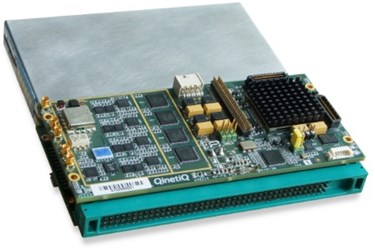Ground Breaking New Robust GNSS Receiver From QinetiQ

QinetiQ has announced a major breakthrough in developing a robust navigation receiver which will utilise the new global navigation satellite system (GNSS) Galileo, and particularly the secured Public Regulated Service (PRS).
QinetiQ has built a high performance, next generation GNSS receiver which will incorporate signals from the new Galileo system (the European equivalent of GPS). The new receiver is multi constellation and multi frequency and is designed to process encrypted signals from the Galileo PRS service as well as open services such as GPS.
The receiver is a significant step towards developing an end-user product for navigation, tracking and timing. It will offer highly secure, accurate and reliable position, velocity and timing intended for users with a mission critical need such as governments, the military and emergency services across Europe.
Dr Nigel Davies, head of QinetiQ’s Secured Navigation Group, said: “We are delighted that, after years of QinetiQ R&D and collaboration with the EU, European Space Agency (ESA) and UK government, we have achieved this major step towards our goal of offering robust navigation products using Galileo. It is a significant breakthrough for us to have built a fully operational receiver on a platform which proves our product architecture, functionality, and algorithms.
“Our next step will be working to refine the product family and preparing it to be brought to market, which includes developing additional features and reducing its size to that of a postage stamp, in a form factor similar to our existing, highly successful, Q20 receiver. We have full confidence in this product and are proud to be at the forefront of this exciting new phase in European navigation.”
The prototype receiver is a multi-constellation, multi-frequency, all in view receiver which can receive and process the Galileo PRS as well as Galileo Open Service and GPS Standard Positioning Service. It is also designed to utilise other GNSS signals including the Russian GLONASS and Chinese Beidou systems as well as space-based augmentation services (SBAS) such as WAAS and EGNOS. The receiver, which is based on the military standard SEM-E form factor, is also designed for integration into multi-sensor navigation systems and is designed to provide high levels of protection against jamming and spoofing. It has a fast acquisition capability and is designed for Government security accreditation.
It is expected that a suite of robust products will be ready by 2020 to coincide with the completion of the Galileo project, which will be the world’s third GNSS to be completed after the USA and Russian systems.
The new receiver is part of a long pedigree in robust GNSS receivers. Q20 was QinetiQ’s first GPS receiver, designed for specific challenging applications: high dynamics, or high sensitivity like tracking from inside a shipping container. QinetiQ’s family of receivers will include two new products, based on the receiver announced today at the UK Space Conference. Q40 will be QinetiQ’s next generation robust open service receiver, which will be a multi constellation, multi frequency open-service receiver which can use signals from all of the GNSS open services. Q50 will incorporate all of the functionality of the Q40 receiver, but also offer Galileo PRS for authorised users who need the additional capabilities and robustness.
Dr Nigel Davies of QinetiQ added: “The device we have built is a major stepping stone to Q40 and Q50 as the technology has all been built for the receiver products and is designed to be shrunk on to a single ASIC microchip. Our focus of attention will now be to turn what we have built into an ASIC product which is ready for market.”
About QinetiQ
A FTSE250 company, QinetiQ uses its world class knowledge, research and innovation to provide high-end technical expertise and advice, to customers in the global aerospace, defence and security markets. QinetiQ's unique position enables it to be a trusted partner to government organisations, predominantly in the UK and the US, including defence departments as well as other international customers in targeted sectors.
Source: QinetiQ
